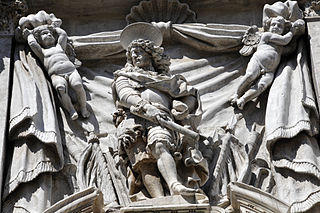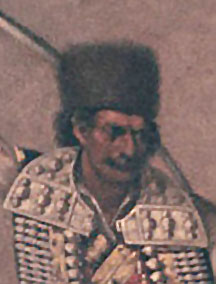 W
WJulije Balović was an entrepreneur, polyglot, judge, sea captain Venetian military officer and collector of epic poetry from Venetian held Perast. Some sources speculated that he authored some of the literature works he collected. Balović wrote several manuscripts which are considered as significant literature works and historical sources. His multilingual dictionary is one of the earliest records of Albanian.
 W
WAntonio Barbaro was a Venetian general and governor, a member of the patrician Barbaro family of Venice. Barbaro lived at a time when Venice had a maritime empire in the Mediterranean. He served in Candia, Crete during the long-lasting Siege of Candia. He was Captain of the Gulf from 1655–56, and in 1667 he became Provveditore generale di Candia. He also served in the Balkans; from 1670 he became the provveditore generale of Venetian Dalmatia and Venetian Albania. When he died, he left 30 thousand "ducati" for the rebuilding of the church of Santa Maria Zobenigo in Venice.
 W
WFrancesco Barbaro (1390–1454) was an Italian politician, diplomat, and humanist from Venice and a member of the patrician Barbaro family. He is interred in the Church of the Frari, Venice.
 W
WMarco Antonio Bragadin, also Marcantonio Bragadin, was a Venetian lawyer and military officer of the Republic of Venice.
 W
WMercurio Bua was an Albanian condottiero active in Italy. His father was Peter Bua, leader of the Albanians in the Morea in the 15th century. Born in Nauplia in 1478, Mercurio Bua moved to Venice in 1489 after his father's death and participated in the important phases of the Italian Wars serving the Republic of Venice, the Duke of Milan Ludovico Sforza, the Kingdom of France, the Holy Roman Emperor Maximilian I and then again Venice. For his deeds the King of France Louis XII rewarded him with the honorary title Count of Aquino and Roccasecca.
 W
WAmbrogio Contarini was a Venetian nobleman, merchant and diplomat known for an account of his travel to Iran.
 W
WIvan Crnojević was the lord of Zeta and Serbian leader from 1465 to 1490. Having formed an uneasy alliance with the Republic of Venice, he led the resistance against the expanding Ottoman Empire. He was successful at first but lost his realm in 1479. He resumed power in 1481 in Žabljak and soon founded Cetinje as the new capital of his state.
 W
WMarino Faliero was the 55th Doge of Venice, appointed on 11 September 1354.
 W
WAlessandro Farnese was an Italian military leader, who was Governor of the Habsburg Netherlands from 1678 until 1682.
 W
WStojan Janković Mitrović was the commander of the Morlach troops in the service of the Republic of Venice, from 1669 until his death in 1687. He participated in the Cretan and Great Turkish War, as the supreme commander of the Venetian Morlach troops, of which he is enumerated in Croatian and Serbian epic poetry. He was one of the best-known uskok/hajduk leaders of Dalmatia.
 W
WAntonio Loredan was a member of the Venetian noble family of Loredan, captain of Venetian-held Scutari and governor in Split, Albania Veneta, and the Morea.
 W
WVuk Mandušić was the capo direttore of the Morlach army, one of the most prominent harambaša in the Dalmatian hinterland, that fought the Ottoman Empire during the Cretan War (1645–69). He is one of the heroes renowned in both Serbian and Croatian epic poetry. The Serb poet-prince-bishop Petar II Petrović Njegoš immortalized him in one of his epic poems, Gorski vjenac, also known in English translation as Mountain Wreath.
 W
WBajo Pivljanin, born Dragojlo Nikolić, was a Serbian hajduk commander mostly active in the Ottoman territories of Herzegovina and southern Dalmatia. Born in Piva, at the time part of the Ottoman Empire, he was an oxen trader who allegedly left his village after experiencing Ottoman injustice. Mentioned in 1654 as a brigand during the Venetian–Ottoman war, he entered the service of the Republic of Venice in 1656. The hajduks were used to protect Venetian Dalmatia. He remained a low-rank hajduk for the following decade, participating in some notable operations such as the raid on Trebinje. Between 1665 and 1668 he quickly rose through the ranks to the level of harambaša. After the war, which ended unfavourably for the Venetians, the hajduks were moved out of their haven in the Bay of Kotor under Ottoman pressure. Between 1671 and 1684 Pivljanin, along with other hajduks and their families, were refugees in Dalmatia. Upon renewed conflict, he was returned to the Bay of Kotor and placed in charge of defending the frontier; in 1685 he and his band fell in battle against the advancing Ottoman governor of Scutari. Regarded as one of the most distinguished hajduks of his time, he is praised in Serbian epic poetry.
 W
WStanislav "Stanko" Sočivica was a Serbian hajduk (brigand) active in the Ottoman territories in western Balkans. Born in a village close to Bileća, his family owned a farm subject to a harsh Ottoman bey family. After murdering the beys and taking their collected taxes, the family subsequently relocated to Venetian Dalmatia from where Sočivica and his brothers began their brigandage. After decades of brigandage, and the capture of his wive and children, he retired to the Habsburg Monarchy, where he was appointed commander of the Pandurs by Emperor Joseph II himself, in 1775.
 W
WTheodore Palaiologos was a 15th- and 16th-century Greek stratiote and diplomat in the service of the Republic of Venice and one of the key early formative figures of the Greek community in Venice. He was not related to the Palaiologos dynasty of the Byzantine Empire, but his family may have been their distant cousins.
 W
WGiuseppe Viscovich, also Josip Visković, was a Venetian count. He was the Captain of the town of Perast, the last territory of the Republic of Venice to surrender to France.
 W
WSir William Waller was an English soldier and politician, who commanded Parliamentarian armies during the First English Civil War, before relinquishing his commission under the 1645 Self-denying Ordinance.